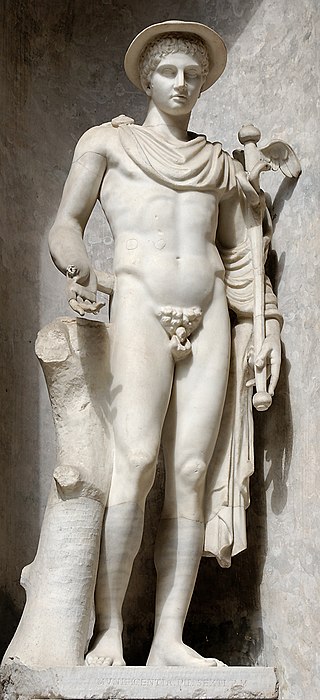Hermes
Olympian god in Greek religion and mythology; the emissary and messenger of the gods; the god of trade, heraldry, merchants, commerce, roads, thieves, trickery, sports, travelers, and athletes; the son of Zeus and the Pleiad Maia From Wikipedia, the free encyclopedia
Hermes is the messenger of the gods. He is the god of winter, travellers and shepherds in Greek mythology. He is one of the Twelve Olympians, and is often shown with his caduceus.
| Hermes | |
|---|---|
Messenger of the gods, god of winter, trade, thieves, travelers, sports, athletes, cunning, wit, sleep, magic, border crossings, guide to the Underworld | |
 Hermes Ingenui (Vatican Museums), Roman copy of the 2nd century BC after a Greek original of the 5th century BC. | |
| Abode | Mount Olympus |
| Symbol | Talaria, caduceus, tortoise, lyre, rooster, Petasos (Winged helmet) |
| Personal information | |
| Consort | Merope, Aphrodite, Dryope, Peitho |
| Children | Pan, Hermaphroditus, Abderus, Autolycus, Eudorus, Angelia, Myrtilus |
| Parents | Zeus and Maia |
| Siblings | Aeacus, Angelos, Aphrodite, Apollo, Ares, Artemis, Athena, Dionysus, Eileithyia, Enyo, Eris, Ersa, Hebe, Helen of Troy, Hephaestus, Heracles, Minos, Pandia, Persephone, Perseus, Rhadamanthus, the Graces, the Horae, the Litae, the Muses, the Moirai |
| Roman equivalent | Mercury |

Hermes is the son of Zeus and Maia. He was born on Mount Cyllene. The story of his birth was told in the Homeric Hymn, which means Hymn to Hermes. It said that Maia was a nymph.
Hermes was very clever and on his first day invented the lyre, by using the shell of a tortoise. He carries a golden sword. One of the myths about Hermes is that he once stole his brother's oxen, and burned them as a sacrifice.
Children
- Tyche was a daughter with Aphrodite.
- Hermaphroditus was a son with Aphrodite.
Related pages
- Hermeticism
- Turms - Etruscan mythology version of Hermes
- Mercury - Roman mythology version of Hermes
Other websites
![]() Media related to Hermes at Wikimedia Commons
Media related to Hermes at Wikimedia Commons
Wikiwand - on
Seamless Wikipedia browsing. On steroids.
